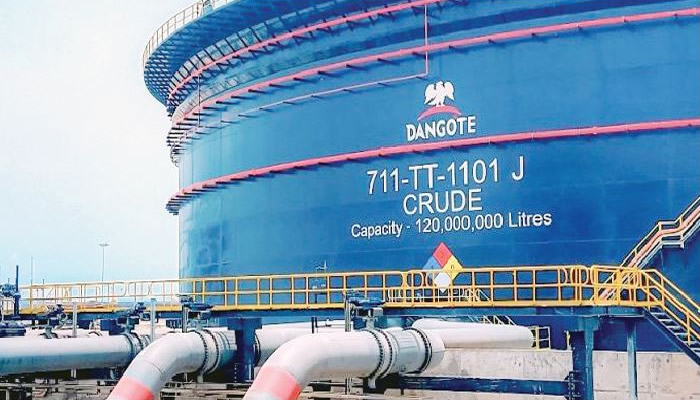The Dangote Petroleum Refinery and Petrochemicals Company has officially commenced construction work on its planned expansion to boost its processing capacity from 650,000 barrels per day (bpd) to 1.4 million bpd. This bold step is expected to make the Lagos-based refinery the largest single-site refining facility in the world once completed, marking another milestone for Africa’s most ambitious industrial project.
Aliko Dangote, the President of Dangote Industries Limited, announced the development during a media briefing at the refinery complex in the Lekki Free Trade Zone, Lagos. He disclosed that the expansion project would be completed within three years and would significantly enhance Nigeria’s self-sufficiency in refined petroleum products. According to him, the refinery already possesses much of the necessary infrastructure to support the next phase of growth, including land, port facilities, and logistical systems.

Dangote noted that the expansion aligns with the federal government’s vision to make Nigeria an exporter of refined products while cutting down the massive cost of fuel importation. He emphasized that the new project would reinforce Nigeria’s status as a major refining hub in Africa and reduce the pressure on foreign exchange caused by fuel import dependency.
The decision to raise capacity to 1.4 million barrels per day is also seen as a strategic move to position the refinery ahead of global competitors. Once operational, the expanded facility will surpass the capacity of India’s Jamnagar Refinery, currently the world’s largest, which processes around 1.36 million barrels per day. The project is expected to strengthen Nigeria’s position in the global energy market and deepen its refining and petrochemical value chains.
Beyond increasing crude oil refining capacity, the expansion will also double the output of key petrochemical products. The refinery plans to scale up production of polypropylene from 900,000 metric tonnes per year to about 2.4 million tonnes. This is expected to boost industrial manufacturing across sectors such as packaging, textiles, automotive, and construction.
According to project officials, construction work will generate approximately 65,000 direct and indirect jobs during the expansion phase, with a large portion of the workforce expected to be Nigerian. The power generation capacity of the facility will also rise from 500 megawatts to 1,000 megawatts, ensuring that the refinery maintains uninterrupted operations and supplies surplus energy to nearby industrial areas.
While the total cost of the expansion was not disclosed, industry analysts estimate that it could require an additional investment running into several billions of dollars. The initial 650,000 bpd project reportedly cost around $20 billion. Dangote Industries has also hinted at the possibility of listing a small percentage of the refinery’s shares on the Nigerian Exchange to raise additional capital and allow Nigerians to participate in the ownership of the project.
The expansion is part of a wider vision to integrate more sectors of Nigeria’s economy into energy and manufacturing. Dangote explained that the project’s long-term goal is not just to meet domestic fuel needs but to create an export-driven industrial economy. He added that the refinery would play a major role in achieving the government’s energy independence goals, especially under initiatives such as the “Nigeria First” and “Naira-for-Crude” policies.
However, experts have pointed out that the success of the expansion will depend on several critical factors, including the availability of crude oil supply. Nigeria’s crude production has struggled in recent years, often falling short of OPEC quotas due to theft, pipeline vandalism, and underinvestment in exploration. Ensuring a stable and sufficient supply of crude will be essential for the refinery to operate at full capacity once the expansion is completed.
There are also considerations regarding environmental sustainability and community impact. The refinery’s location in the Lekki Free Trade Zone has raised concerns in the past about its effects on local ecosystems and fishing communities. Dangote Industries has pledged to adopt international environmental standards and invest in local development initiatives to mitigate potential impacts.
Despite the challenges, industry observers see the expansion as a landmark step that could redefine Nigeria’s economic trajectory. The increased refining capacity would enable the country to stop fuel importation, save billions of dollars in foreign exchange, and stabilize fuel prices domestically. It could also turn Nigeria into a net exporter of refined products to neighboring West African countries, thereby improving regional energy security.
Economists believe the refinery’s expansion could spur broader economic growth, generate new investment opportunities, and provide a stable foundation for Nigeria’s industrial diversification. By producing refined petroleum products and petrochemicals locally, the project is expected to drive industrialization, create jobs, and boost GDP growth.
As construction begins on this massive expansion, expectations remain high. The Dangote Refinery has already transformed Nigeria’s energy landscape by introducing advanced refining technology and reducing import dependency. With this latest project, Nigeria stands at the threshold of becoming not only Africa’s largest energy producer but also a major global player in petroleum refining and petrochemicals.
Support InfoStride News' Credible Journalism: Only credible journalism can guarantee a fair, accountable and transparent society, including democracy and government. It involves a lot of efforts and money. We need your support. Click here to Donate
